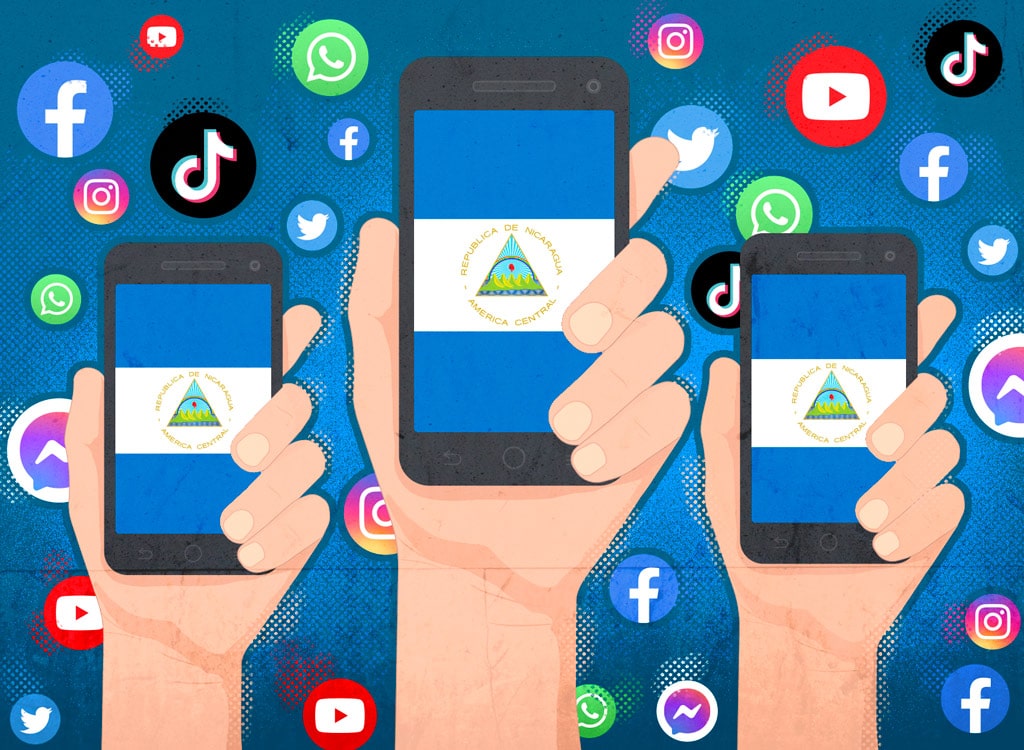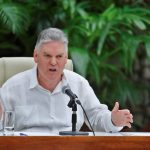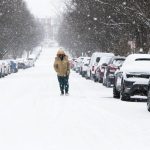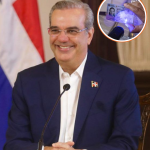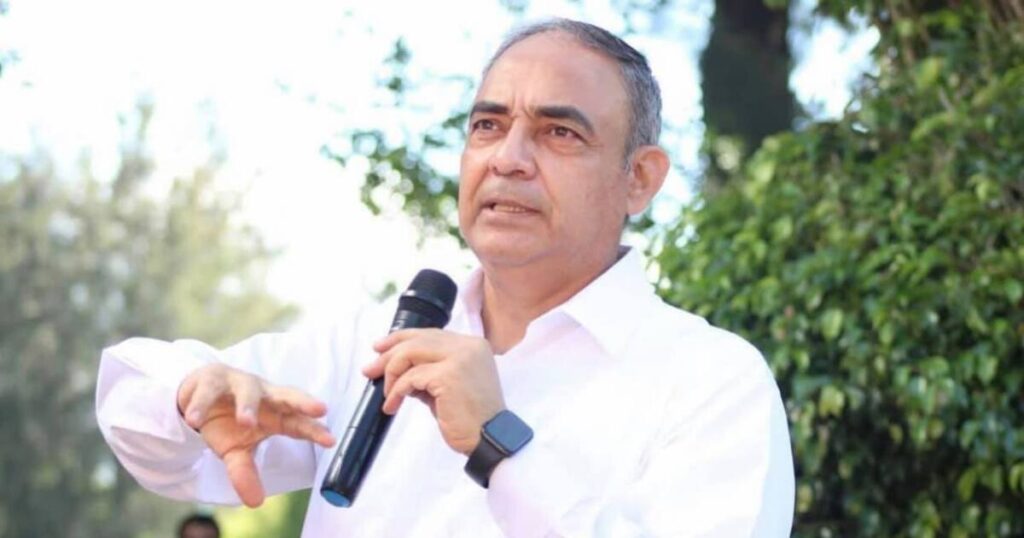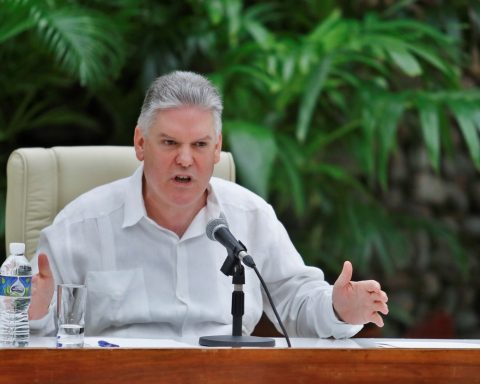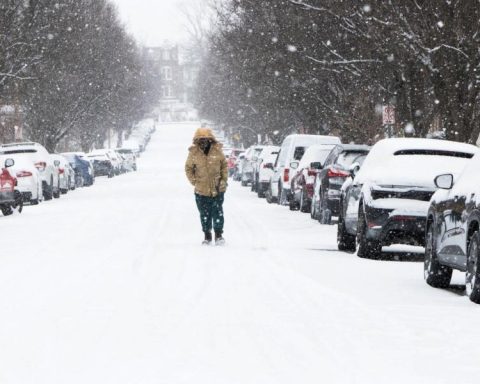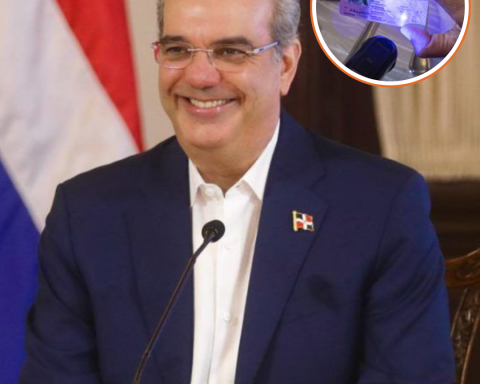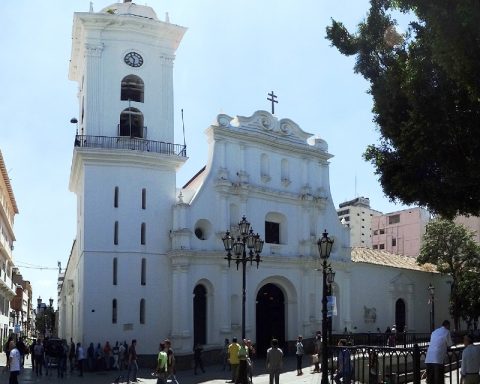During 2021, Nicaraguans traveled a very difficult path communicating their opinions through social networks, in which resistance to the dictatorship is maintained, the self-censorship caused by the regime through its threatening laws that seek to impose a single discourse – the orteguista – in all of society.
In the space of digital communication, the battle to make political narratives prevail has been arduous between blue and white sympathizers and militants of the red and black party, but also between the blue and white communities themselves. Twitter, Facebook, Instagram, YouTube, WhatsApp, Telegram … All social networks have hosted heated debates where there is no account, channel or profile that has escaped unscathed this year.
In its uses, Nicaraguans in social networks have experienced behaviors that range from the joy of publishing a tweet or post greeting the new democratic day that will accompany a photo with their cup of coffee, until in a matter of minutes it became a misunderstanding, ideological discrepancy, a real brawl, organized lynching to the extreme of threats to human integrity.
If in January social networks were loaded with political thought – rude and loud, yes – that made the public debate throb, we went through July amazed by the violent actions of the dictators applying their gag laws (the Cybercrime and Foreign Agents) And we arrived in December with a decrease in tone that did not come from serene maturity but from the terror that the Ortega and Murillo regime spread, first in the physical streets and then in the digital streets by decreeing that neither on social networks can a citizen say what he thinks freely under penalty of jail.
Those complaining about what they described as the “screaming” of the Nicaraguan people on social networks now nostalgically recall how digital channels vibrated transferring ideas from all existing ideological angles. Everyone does not miss those sometimes useless debates, but debates at last, in the networks that became the only space for freedom of expression in 2021. To Ortega and Murillo, for example, it seems that this silent mode of the Nicaraguan on the networks is an ideal scenario. They provoked it with their terror, they like it.
The cunning of the Nicaraguan people in the face of digital censorship
With the spread of darkness in Nicaraguan civic spaces, the regime feels comfortable. He deludes himself into believing that everything is normal. But it cannot control the companies of the social networks that by nature offer several alternatives so that the digital conversation does not decline, which is also their business: to keep the user as long as possible in their social network and therefore facilitates the ways.
And neither did the regime count on the astuteness of the Nicaraguan people when using their social networks: most of them went to create anonymous accounts on Twitter (not false) to continue talking, on Facebook they narrowed their profiles to share political content on small networks, WhatsApp It is still the channel for political organization, strategic policy meetings abound by Zoom, independent media resist reporting content with a high-impact transplantation communication strategy, on Instagram the Nicaraguan people created their lists of “close friends” (close friends ) and continue to share stories denouncing the regime on a daily basis! And almost everyone, even the influencers who distribute commercial content, created their virtual private network (VPN) to avoid being detected by the spy accounts of Ortega that infiltrate as followers in all the networks and later report if any user did not kneel. before dictators.
And furthermore, this does not seem to have a remedy for 2022. At least, as long as constitutional citizen rights are not restored in physical reality (freedom of expression and thought, freedom of association, of assembly, among others) because who is going to return to their authentic digital identity if the very act of participating in social networks is being seen as destabilizing behavior for those who sleep in El Carmen?
With so much censorship, not even Spider-Man was saved this December because, for safety and caution, Nicaraguans no longer use hashtags (labels) to avoid being detected by the regime on social networks the premiere of the most recent film by Marvel Comics superheroes had no impact on the trending records. If in all the countries where the film was released, users used #SpiderManNoWayHome to share their experience, in Nicaragua the Trendsmap application (which observes trends on Twitter) registered zero –yes, ZERO- activity on the label. Of course, the Nicaraguans went to see the superhero face the five villains, but they could not freely integrate into the global conversation because the regime watches over them even in that and also does not want the Nicaraguan to communicate with the outside world.
And this trend could continue in 2022, because what the regime is causing with its censorship is not knowing what the Nicaraguan are doing, even if they do. Not knowing what the Nicaraguan people think, even if they think so. Not knowing how Nicaraguan people behave, even if they behave. Not knowing the discomforts of the Nicaraguan, even if they feel discomfort. And this is how April broke out in 2018: Ortega did not see the social discontent coming because he despised the social and political conversation that occurred on social networks where # YaNoMás was said and shouted. The regime provokes with its repression and censorship the next social outbreak.
The battle for public opinion
The Carmen. The site from which the communication strategies that put Ortega and his party, the Sandinista National Liberation Front (FSLN), to world shame emanate. They didn’t want to make a fool of the commander, but that’s what they got for blatantly trying to manipulate the social media algorithm.
What happened is that Ortega concluded that in 2021 it was necessary to give “imperialism” “with everything” also on social networks to demonstrate their truth: they consider themselves misunderstood by the world that has condemned the massacre perpetrated in 2018. The strategic failure It was because they did not have enough support from Nicaraguan society, they decided to invent a wide network of false accounts supported by a tactic of replication of propaganda content that violated the rules of all social networks. And they believed that in this way they were fooling Nicaraguan society quite easily. But Meta, owner of Facebook, and her partners came along and dismantled the deceptive network.
We have already warned all Nicaraguan digital communities: “The political debate in Nicaragua must be sanitized by its own users. If not, we will have to accept that it is sanitized by the algorithms of social networks. If we are not able to moderate our political culture of dialogue of ideas on social networks, it will be the social networks themselves that will modify this cultural behavior. And so we will no longer be just Nicaraguans, but Nicaraguans molded by internet algorithms ”.
Because the intervention of the social media companies -Meta and Twitter- came late when the damage in the digital conversation was considerable and the civic and public debate in Nicaragua was very badly hurt, but it arrived in a forceful way, just as as we report here. This action has lessons for all digital communities in Nicaragua in the coming year, as also from the blue and white some were tempted to create their own networks of fake accounts to promote content and create fictitious thought trends.
It is true that many users are more likely than others to believe the amount of “Likes” and get infected by those numbers and people who want to manipulate the civic debate take advantage of this ignorance of the Nicaraguan people. This is also a lesson that users learned this year and it will help them not to repeat by 2022: not to fall into the temptation of deceiving followers by creating fake accounts. We already know that there is no return from that path, it is enough to observe the Ortega network today totally dismantled, without any impact, dozens of accounts suspended and also those newly created are suspended again. On Twitter, Facebook and Tik Tok, Ortega manipulation came to nothing.
If the Nicaraguan society that creates content on social networks knew that the regime lost the battle for public opinion that day that it sent to repress those who protested the Indio Maíz fire, starting the citizen rebellion that the regime has against the strings, at the end of 2021 there is already enough evidence that in a fair law, Ortega has lost the battle for public opinion and that Nicaraguan society continues to reject it.
Also the Nicaraguan society gathered in their digital communities learned that false news (fake news) and hate speech, and more recently, indecent and rude political narrative (see here) it has Daniel Ortega and Rosario Murillo as its greatest exponents. For this reason, in order to clean up the public debate, it is enough not to repeat the behavior of the political culture of the regime that, to create a fictitious enemy among Nicaraguans, resorts to degrading adjectives and accusations. ad hominem.
2022 is projected as a year that challenges the ingenuity of Nicaraguans to use social networks and get the best possible out of them. Not only to support the pro-democracy political story among Nicaraguans and to the entire world, but also to defend a stronghold of citizen dignity such as being able to express political ideas freely, at least in the digital society. For Ortega, the challenge consists in practicing political communication on social networks in a fair law and without deception, learning to swim in the waters of Nicaraguan public debate – turbulent waters, yes, that require civic and technical training – to demonstrate to their militants and sympathizers that their ideological proposal is strong enough and that they are not a scarecrow that, in the drunkenness of power, pretends to have a people, votes, followers and “I like you.”
